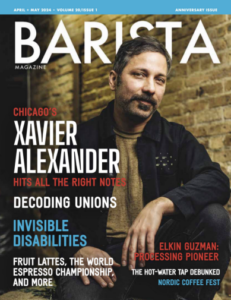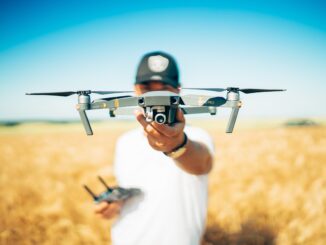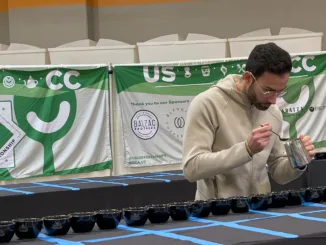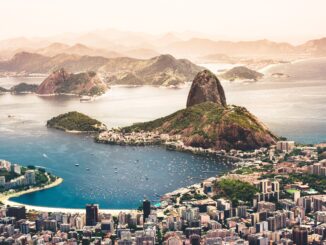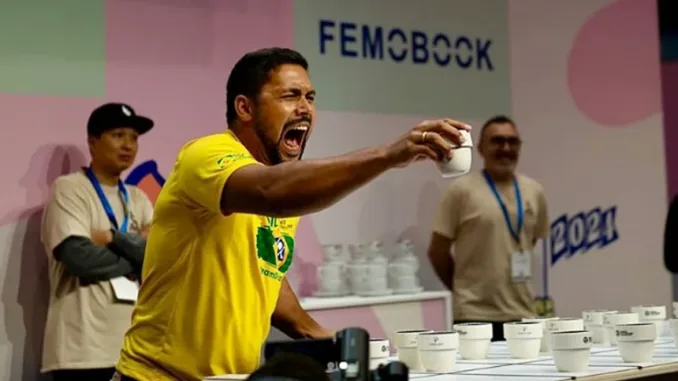
Dionatan Almeida grew up playing on coffee farms in Três Pontas, Brazil, ”the world capital of coffee.” Here’s how he grew to become a champion.
BY ISABELLE MANI
SPECIAL TO BARISTA MAGAZINE ONLINE
Featured photo courtesy of BSCA
The 2024 World Cup Tasters Champion Dionatan Almeida, 29, is the first Brazilian to win the title.
Dionatan hails from Sul de Minas, one of Brazil’s main denominations of origin, and is a fourth-generation coffee producer.
Before arriving in Chicago for his first international trip, Dionatan had only cupped Brazilian coffees, with few exceptions. Still, he finished the final round of the World Cup Tasters Championship, held at the 2024 Specialty Coffee Expo in Chicago, at a winning time of 2 minutes and 19 seconds.
I spoke with Dionatan, who works in quality and post-harvest processing, about his story, his training as a cupper and taster, and how he envisions his future after winning the title.
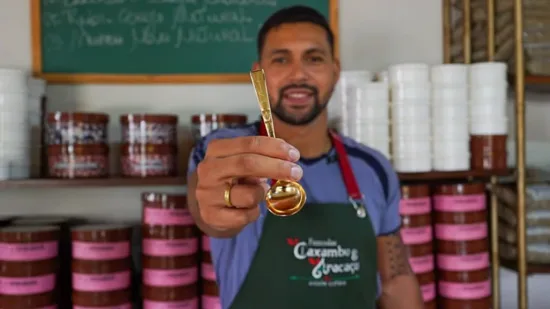
Early Life in Coffee
”Três Pontas, the world capital of coffee”—that’s the self-proclaimed city slogan that Dionathan says he has heard first thing in the morning on the local radio since childhood. The city is the hub of the Sul do Cerrado coffee-farming area, one of Brazil’s 15 Controlled Denominations of Origin, and the second-highest producing region in terms of specialty-coffee volume.
For Dionatan, Três Pontas is truly the center of the universe: His great-grandparents, grandparents, and parents have all been coffee field workers. His father drove tractors, and his mother is a coffee picker—a profession she still practices today. ”I grew up playing in coffee farms,” Dionathan says.
At 16, in 2011, Dionatan took his first job at Fazendas Caxambu and Aracaçu, where he still works today. ”I started working in the fields, moving the coffee on the patio, drying coffee, whatever was needed,” he says. Dionatan lived on the farm until he was 18, during which time he worked during the day and studied at night. “I used to leave at 4 p.m. and often didn’t get home until 1 a.m. because of transportation difficulties,” he says. ”But I finished high school.”
His journey into quality control and sensory evaluation began in 2015. The farm administrator, Carmem Lucia “Ucha” Chaves de Brito (the current president of the BSCA and the first woman ever to occupy the position), asked him if he was interested in training in specialty-coffee quality control, a production niche the farm had just begun to explore. He had no idea he would fall in love with coffee so intensely.
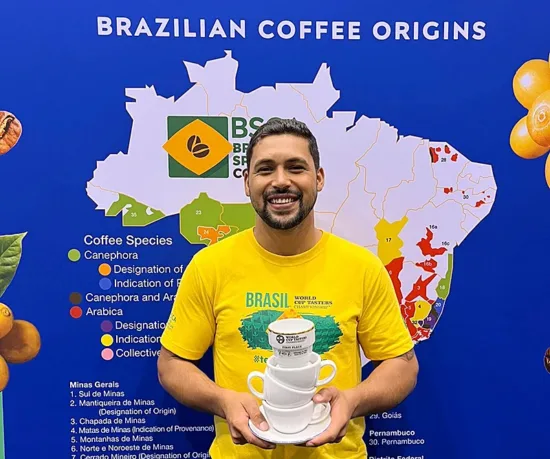
”At first, it was just work. But delving into quality coffee, I found a deeper appreciation for the attention to detail and care that goes into specialty coffee. It’s a journey that’s opened up a whole new world of possibilities.”
In 2016, he became a Q Grader and enrolled in a technical course in Coffee Technology. The following year, at 20, he took on his current position as quality director.
”I love my job because I never know what I might find when cupping coffee. That fascinates me; I’m always thinking about how to process coffee and achieve certain notes and flavors, how creating an interesting profile starts in the farm and ends in the brewing,” he says. Dionatan adds that since he took on his role, the production index of specialty coffees at the farm has risen from 8% to 87%.
Dionatan says he soon realized that tasting coffee was “the easiest task” among his tasks. Working with quality is a panoramic function, he explains: “It’s necessary to direct, evaluate, and understand the final consumer, grasping objectively the nuances of expectations and tastes to market the coffees.”
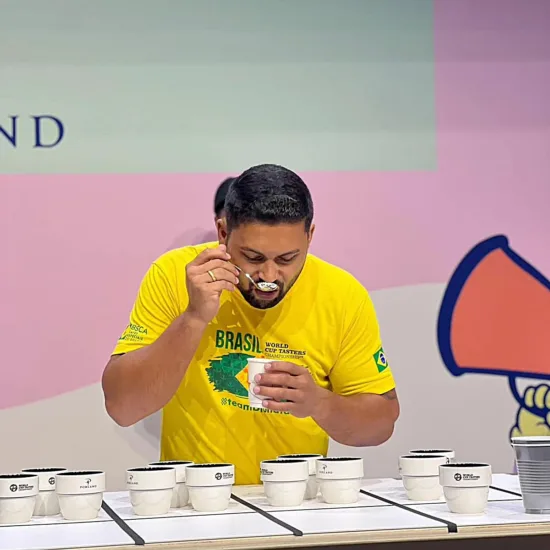
The Road to Chicago
”I found out that this kind of competition existed only in 2020, and after the pandemic, in 2022, I decided to enroll in the Brazilian championship,” Dionatan says. He explains one of the motivating factors for competing was the possibility of fulfilling an old dream: getting to travel to other countries and learn about other cultures.
He trained during lunch breaks and on weekends, and got third place at the 2022 competition in Brazil. In 2023, he became the national champion, which secured him a spot at the 2024 World Cup Tasters Championship, which took place in April. Chicago was his first international trip.
Dionatan says that part of his work is receiving clients from all over the world and that, early in his journey, he understood that modulating his perception of flavors and notes from the SCA’s wheel was an essential part of working in quality control. ”Cupping with so many people taught me to associate aromas and flavors that were unknown to me with the ones I already knew,” he says.
He believes his skills in profiling coffee enabled him to reach the final round, even though he didn’t have much familiarity with coffees from outside of Brazil.
”Finding coffees from other origins in the Brazilian specialty scene is difficult. Brazil produces specialty coffee in a very wide variety of profiles, each with its terroir and climate. We don’t import coffee; there’s no need,” he says.
In Chicago, Tim Taylor from Pedestrian Coffee hosted Dionatan for his intensive pre-event training, which lasted only a week, in which his primary focus was to familiarize himself with coffee produced in other countries. ”This part was easy,” he says, revealing that the only difficulty he faced was cupping coffees from Asia, whose sensory profiles, he says, ”I had no basis for grading.”
Dionatan says he faced some difficulties preparing for the trip, such as having his visa denied for a two-month stay and only receiving confirmation of entry to the U.S. less than a month before the event. His coach fell ill and only arrived in the city one day before the competition. But it all turned out great: “Even if I didn’t win, my week of training was very fulfilling,” he says.
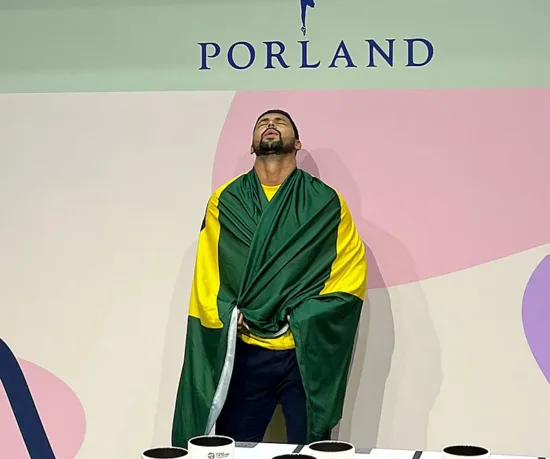
A Representation Shift
There was another World Cup Tasters competitor from a producing country that was also involved with farming: Jonathan Rangel of Guatemala placed fourth at the event. ”I was happy to see myself in the final with him,” Dionatan says. ”In past editions, and especially in barista championships, most of the top-ranked were from consumer countries.”
The density of specialty-coffee consumption or high-quality fine cups in producing countries is factually small. These countries are predominantly former colonies with a history of focusing on exporting their commodities, which tended to lead the local population to consume products of the lowest-quality scale.
In Brazil, it is common to say that ”our best coffee goes abroad.” However, the number of specialty-coffee consumers keeps growing in the world’s largest producing country: From 2022 to 2023, there was an increase of 7.47% in domestic specialty-coffee consumption, per the BSCA.
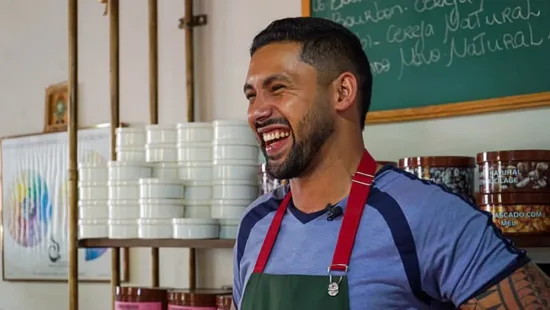
Looking Ahead
Representing his country was a unique and joyful experience, says Dionatan. But he’s allowing himself to process its significance without haste.
”What touched me the most since I returned was hearing people, even outside the industry, telling me they were inspired by my story because I come from a background of a coffee field worker,” he says. This realization has already given him a path forward: He intends to focus on education and sharing his knowledge “so that other people can access opportunities like the ones I’ve had, which changed my life.”
”Winning this title, honestly, is not about me, it’s about Brazil, it’s about empowering the work of people like me. The fact that Boram (Um, the current international champion barista, and cover of the August + September 2023 issue of Barista Magazine) and I are the best in the world is very exciting,” he says.
Dionatan says that he’s pleased with his job and life at the farm. Until all the coffee is processed, post-harvest is finished, and his coffees are profiled, Dionatan says everything else takes a back seat.
”I am grateful for the opportunity this title has given me. But my main focus is here and now on the farm: Harvest season approaches, the coffee cherries are almost ready for picking, and I can’t wait to ‘meet’ these coffees,” he says.
ABOUT THE AUTHOR
Isabelle Mani (she/her) is a writer, journalist, and communicator specializing in the international coffee industry. Since 2017, she has focused on writing articles and features for various international coffee news outlets. Isabelle has traveled to coffee-producing countries such as Colombia, Kenya, Rwanda, China, and Brazil to study and research coffee. She holds training certifications from the Specialty Coffee Association (SCA) and the Coffee Quality Institute (Arabica Q Grading).
Subscribe and More!
Out now: It’s the April + May 2024 issue of Barista Magazine! Read it for free with our digital edition. And for more than three years’ worth of issues, visit our digital edition archives here.
You can order a hard copy of the magazine through our online store here, or start a subscription for one year or two.

